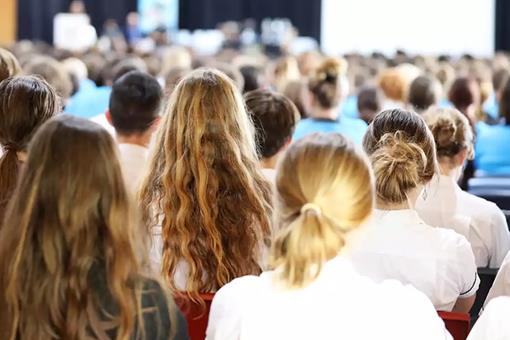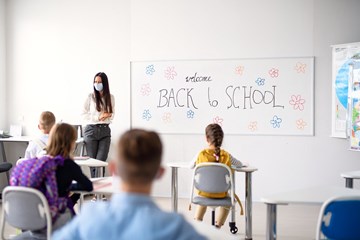Key challenges for the future of School Business Managers

In 2020, the role of School Business Manager has been incredibly tough. In exceptional circumstances, school leaders across the UK have worked to keep their schools safe and able to deliver the best education possible.
As an extraordinary year draws to a close, the impact of the pandemic on the role of SBMs is starting to become clear. Here, we’ll draw on our recent research and beyond to decipher the key challenges faced by school business managers in the years ahead.
The biggest challenges facing SBMs today
The impact of the pandemic
There is really only one place to start. The COVID-19 crisis has thrown many industries in the UK into turmoil, and education is no exception. All the key challenges we’ll speak about here either derive directly from, or are exasperated by, the global pandemic.
It came as no surprise that, in a recent survey of 70 SBMs we conducted, 56% said COVID or a directly related issue (such as lockdowns or guidelines) was the biggest challenge they had faced at work this year.
Here are some of the responses to the question “What have you found the most difficult about your job in 2020?”:
- The unknowns. We are used to dealing with unexpected jobs flying in sideways but the whole year seems to have been unknown. It's hard to do the 'day job' sometimes when you're constantly firefighting. Or should that be COVID fighting
- Still doing my job in lockdown with limited staff at school due to social distancing
- Managing the ever-changing government H&S guidance regarding COVID
While these responses directly mentioned COVID or a related topic, many others spoke of SBM challenges that were already well established but can only have been made worse by the extreme circumstances of the pandemic.
Workload pressures
One of which is the unprecedented increase in workload and inevitable stress that comes from it. At the best of times SBMs, and indeed every member of staff within schools, are stretched to their limit. In these uncertain times, the increase in workload has been substantial.
It’s something that our survey confirmed. 32% of SBMs cited workloads or another stress-related factor as their biggest challenge of 2020. Some of the responses include:
“What have you found the most difficult about your job in 2020?”
- Time constraints, trying to do everything required within a working day
- Too much to do, too little time
- Not getting burnt out
It’s confirmed by data from elsewhere too. A research piece into the State of Education due to the pandemic by The Key found that SBMs were dealing with unprecedented workplace pressures. They found that 52% of all SBMs said they were working at least 7 hours overtime each week since the start of the pandemic.
The extra workload is having a damaging effect on the mental health of SBMs. 49% said the pandemic had been a negative influence on their mental health.
A lack of support
Given the uncertainty and ever-changing situation we’ve found during the pandemic, it’s no surprise that SBMs and other leaders in school have found themselves lacking support. As reported by the BBC in September, the 5,000 strong network of Headteachers, WorthLess?, said the government’s test and tract system was too slow, leading to isolating teachers and staff shortages.
Many SBMs in our survey cited ever-changing guidelines and a general lack of support to be significant challenges they have faced:
“What have you found the most difficult about your job in 2020?”
- Constant changes and lack of information and support from the DfE
- Managing the ever-changing government H&S guidance re COVID
- Keeping up with government legislation or finding supplies of cleaning materials
In these testing times, the SBM community has rallied. For anyone feeling the strain, know that there is support out there for you – as we detailed in our piece on the places SBMS can go for support.
The widening education gap
In the face of the ongoing pandemic, we’re increasingly coming to terms with the realities of an educational gap. Inevitably, the drawbacks of home schooling and schools closing falls most heavily on poorer schools and children from poorer families. An Institute for Fiscal Studies study found that:
- Children from better-off families spent 30% more time home learning than poorer families during lockdown
- Better-off pupils have access to more resources for home learning
- School closures are almost certain to increase educational inequalities
On top of the inequalities opening up educationally, poorer schools have had greater difficulties adapting to home learning, with richer primary-aged children more likely to receive online support from their school. Once schools reopened, the financial requirements to meet COVID-secure guidelines also hits poorer schools harder.
It’s lead to some teachers saying pupils may take up to two years to bring some children back to their correct attainment level, and SBMs saying they are mentally exhausted.
Budgetary demand
It’s not just educationally where schools are counting the cost of the pandemic. From a financial perspective, it is now coming to light just how much money schools are spending and losing as a direct result of COVID.
Our SBM survey found that, on average, schools have spent £9,444 making their learning environment COVID-safe. Out research was supported by a recent study from NAHT, who found a very similar figure of £9,900 of COVID-spent per school. That same research also found that schools estimate they have seen an average of £15,915 in lost income.
It all adds up to a challenging environment for SBMs, and one that isn’t likely to improve in the near future. All we can say from everyone here at GLS is thank you for your continually outstanding service and effort in the most trying circumstances.
Over the coming months, we’ll be here, and on our Twitter channel, helping the SBM community in whatever way we can. Stay tuned for more on our SBM survey too – full findings to be posted in the coming weeks.




